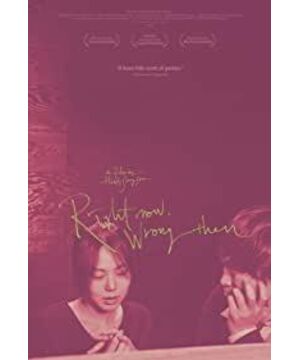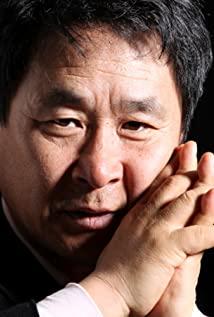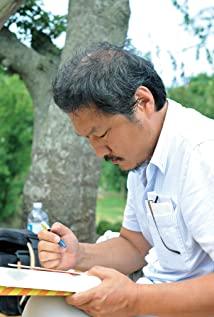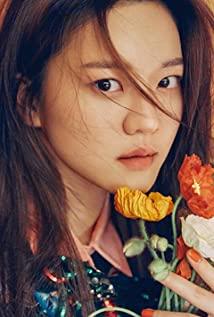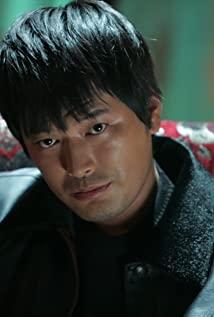Because the film mainly shows the male and female protagonists, so, for the first question, right or wrong is of course for the two of them; because the title of the film is "right now and wrong then", so for the first question (1) 2) A question, we can say that right or wrong is judged by the director; because the "what" in question (1) is actually the different behaviors presented by the hero and heroine's interaction in the two articles before and after, so, in question (3) The basis of judgment should involve the ethics of intercourse between the sexes. So what might this ethic of communication be? Is it worth maintaining or criticizing?
When we finish watching this film, we seem to be more willing to accept the ending in the second part. It can be said that this is due to universal human nature, because everyone likes to see the ending full of positive emotions. However, the desirability of the ending does not mean that the process is justified. When the general needs of human nature take precedence over the needs of individual human nature, it will also bring about intense ethical conflicts, especially for this kind of matter involving sexual intercourse, the perspectives of men and women looking at the problem. It might be different, or even opposite. Then, we might as well stand from the perspective of men (because the director is a man), and first compare the behavior of men and women in the two chapters to see what factors lead to the different endings of the two chapters, and the ethical requirements behind these factors Is it equally fair.
On the whole, in the first part, the relationship between men and women is relatively equal, especially when facing famous directors, the heroine who is an ordinary literary youth still behaves neither humble nor arrogant, but in the second part, this attitude seems to be reversed, and the heroine fully expresses This kind of "weakness", to put it bluntly, means that in the eyes of men, a woman should have the appearance of a woman, such as being soft-spoken, humble in attitude, gentle and considerate towards men, etc. We can find some concrete details to demonstrate this.
In terms of personality characteristics, the heroine in the first part is stronger. For example, she talks to the male lead about "sensitive" issues, and discusses the difference between "famous" and "complimented". This shows that she loves to express her personality, which may seem like a man. It's kind of "showing off"; she's proud to say she's been a "model" when she talks about the work she's done. In the second part, she only mentioned that she had done other jobs, and now she only makes a living by painting, without mentioning "models" at all, and didn't think of herself as a strong woman, and she didn't talk too much.
In terms of life attitude, the heroine in the first chapter has a tendency to be decadent, such as smoking when she enters the studio, and she also says "just think about everything and live peacefully", "just make sure that you are still alive every day"; In the article, the heroine mentioned that she had quit smoking and drinking. When talking about the topic of "boring", she did not understand why others were bored. She said: "There are so many things that I can do, and I will not be bored."
In the manner of intercourse between men and women, the heroine in the first chapter is too active. For example, although the male protagonist eagerly invited her to have coffee with her, she readily agreed; when the male protagonist said she wanted to see her paintings, she hinted, "I can show you later, if you really want to see it." , and then took the initiative to show the male protagonist a painting; in the studio, he repeatedly asked the male protagonist to buy coffee at the downstairs supermarket several times, which seemed too affectionate; when inviting the male protagonist to her friend's party, he also showed unsatisfactory The purpose is not to give up. In the second part, the heroine hesitated for a long time before agreeing to have coffee together, the hero also expressed his desire to see paintings, and the heroine agreed to take him to the studio only when he asked to see the paintings again; in the studio, the heroine did not He was so affectionate to him; inviting the male protagonist to the party did not appear to be so strong, with a "don't go or leave" attitude.
Regarding the attitude towards "the opposite sex", the heroine in the first part is more casual, while the latter part is very serious. This can be seen from the attitude of the heroine to the different evaluations before and after when the male protagonist evaluates the works of the female protagonist. In the first part, the male protagonist used clichés to praise the female protagonist's work, but the female protagonist didn't care when she found out later. Moreover, he seemed to use the word "simple" intentionally to ask her to paint, but she accepted it indifferently. She is not sensitive to the evaluation of the opposite sex; but in the second part, the male protagonist uses his feelings for her to evaluate her works, using words such as "have quality" and "have love in your heart" to ask her Painting, this greatly stimulated her self-esteem, because although he was implying that her heart was too pure, she may have understood it as "empty", although this caused her to react violently, and even murdered him, accused him, She scolded him, but at the same time persuaded him to quit smoking, and let the male protagonist go back to the house very considerately, which is enough to show that she will take life as seriously as a "woman".
When it comes to her attitude towards "sex", the heroine in the first chapter does not seem to be conservative enough. When she mentions "no friends", she suggests "why I don't have that". Her so-called "that" refers to What? It seems obvious, because even if she didn't express her "desire", it caused the male protagonist to look strangely, and the heroine in the second part never talked about this topic; There is no that", and in the second part, the heroine thinks that it is "my fault".
When dealing with the opposite sex "showing love", the heroine in the first part heard the man say that when he was with a girl like this for the first time, he was so happy that he was immediately ambiguous and intimate. , but talked about the male leads' "feeling" issue with a skeptical attitude; when the heroine heard the male lead say "I like it more than a friend" in the previous chapter, she hoped that the male lead would say "love" directly, so she asked "I What?"; and when the heroine in the latter part heard the expression of the hero's love, she just politely said "I want to confirm".
It seems that the above list does not need to be summarized to illustrate the problem. It is the different performances of the female protagonists in the front and rear that make them win the respect of their respective male protagonists: in the first part, the male protagonist only regards the female protagonist as a general friend, so he Thank her for being able to accompany him, and in the second chapter, the male protagonist regards her as a "lover", just because he is married, so he is very grateful to her for allowing him to still have a "feeling of love". This also explains why the ending of the latter part is satisfactory: the heroine in the latter part simply follows the universal ethics of intercourse between men and women, that is, the behavior of the heroine in the former part should not appear, although this requirement is social Sexual, but may also be seen as a product of male dominance.
No matter how we speculate on the film's intentions, the director seems to have trouble getting rid of our accusations that he is masculinity, and although he can refute him only for "exposure", he allows people to interpret the meaning against him, of course he be responsible for this. Therefore, this film was "19 banned" in South Korea. Perhaps when this film was submitted for review, the reviewer was a feminist. If she did not agree with the relationship ethics revealed by this film, she had the responsibility not to let it affect the next generation. generation. (Text/Slate Planting Flowers on Monday, November 9, 2015)
Ps Zhi Xie to the Chinese subtitle translators of the FIX subtitle group: Thirteen, Mijiao, Unhappy, Sarang, Xia Mo.
View more about Right Now, Wrong Then reviews


